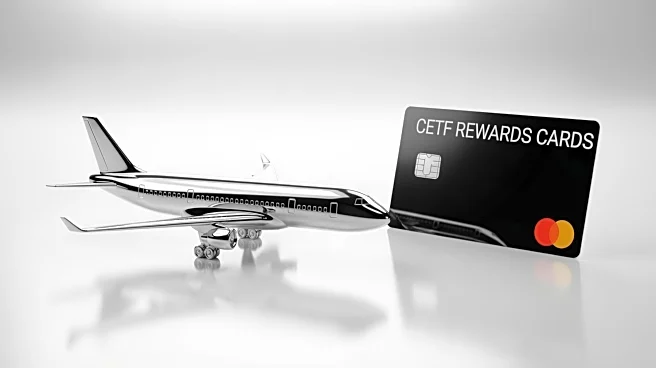What's Happening?
Visa and Mastercard are nearing a settlement in a 20-year lawsuit that could allow merchants to reject certain categories of credit cards, such as business and rewards cards. This settlement aims to reduce credit card interchange fees by an average of 10
basis points over several years. The potential changes could significantly impact the airline industry, which relies heavily on credit card revenue. Airlines have historically used credit card partnerships to drive revenue, with companies like Delta Air Lines choosing routes based on credit card customer acquisition. The settlement could lead to merchants steering consumers away from rewards cards, affecting the lucrative rewards ecosystem.
Why It's Important?
The settlement could have profound effects on the airline industry, which depends on credit card revenue for financial stability. Airlines have used credit card partnerships to raise liquidity during economic downturns, such as the Great Recession and the COVID-19 pandemic. If merchants begin rejecting rewards cards, airlines may face challenges in maintaining their current revenue streams. Additionally, the settlement could influence legislative efforts like the Credit Card Competition Act, potentially stabilizing interchange fees at current levels. This development could also pressure American Express to adjust its interchange fees to maintain acceptance among merchants.
What's Next?
If the settlement is finalized, merchants may start selectively rejecting rewards cards, particularly in low-margin or high-ticket sectors like gas, utilities, and medical billing. This could lead to broader use of surcharging and adjustments in issuer portfolios to offer non-rewards cards. The settlement may also defuse momentum behind legislative efforts to reduce interchange fees, stabilizing the current fee structure. Airlines and credit card companies will need to adapt to these changes, potentially renegotiating co-brand deals and exploring new revenue strategies.
Beyond the Headlines
The settlement could trigger long-term shifts in consumer payment behavior, as merchants steer away from high-interchange products. This may lead to increased transaction costs for consumers through surcharges and the hassle of managing multiple payment methods. The overall business of payment networks and the associated revenue for airlines may remain largely intact, but the rewards ecosystem could face challenges at the margins.















